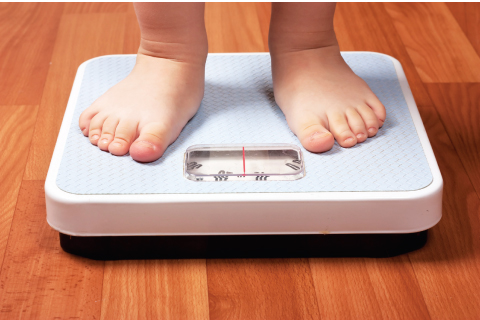How to Take on the Scale in a Healthy Way

Sparks flew over one of Vogue magazine’s 2012 pieces in which Dara-Lynn Weiss discussed putting her 7-year-old daughter, Bea, on a strict diet. Weiss’s pediatrician had informed her that her child was clinically obese and Weiss imposed a strict diet over a year, the techniques of which were intensely debated by those who read the article. Austin Fit Magazine asked nationally recognized pediatrician Dr. Ari Brown some questions regarding the sometimes difficult subject of children and weight. Here’s what she had to say:
AFM: When should a parent become worried about a child’s weight?
Dr. Brown:
Parents should look at two things:
a) The BMI: BMI stands for the body mass index, a measure of a person’s weight compared to his height. While it certainly isn’t perfect, a BMI over the 85th percentile is concerning for a child being overweight.
b) Growth: A child’s growth curves over time. It can be a red flag if a child’s weight percentile is creeping upwards or crossing beyond what is expected weight gain over a period of time.
What kinds of questions should parents ask their pediatricians regarding weight concerns?
Dr. Brown:
Parents can track their children’s growth at home by downloading free growth charts here: www.cdc.gov/growthcharts/cdc_charts.htm. But growth and healthy nutrition are important topics your child’s doctor should discuss at well child visits or at other visits when concerns arise. Specifically, ask how much fat intake is appropriate for your child’s age (infants and toddlers need more than older kids). Ask what a typical serving size should be for your child’s age. And, finally, ask for any insider advice on how to get your kid to eat vegetables and anything green!
What kind of guidance should a parent expect from a pediatrician regarding weight loss for children?
Dr. Brown:
By looking at growth charts together, your pediatrician can offer goals for healthy and appropriate weight loss. Since children who have not gone through puberty yet are still growing, sometimes the right goal for a child is to not gain any weight over a period of time as opposed to losing weight. This is why is it important to involve your child’s doctor in decisions regarding a dieting strategy.
Describe your thoughts on “dieting” for children.
Dr. Brown:
avoid using the word “dieting” for kids. I prefer to say that kids need to learn how to adopt a healthy lifestyle, and part of that is eating a healthy diet. There are some very simple ways to reduce unnecessary calories, which, over time, can make a big impact on a child’s nutrition. Just going from one percent to skim milk, cutting out cola, chips, candy, and cookies in the pantry (I call them, “the 4 Cs”) might be all a parent needs to do!
Are babies ever “fat”?
Dr. Brown:
We do not track the BMI (body mass index) in kids under age 2, but we do follow their weight curves closely. For toddlers ages 1-2 whose weight is significantly greater than their height, the advice from the American Association of Pediatricians is to offer two percent milk instead of whole milk. So, yes, some babies can be overweight.
Is it more important to focus on exercise or nutrition when a child is overweight?
Dr. Brown:
Both are extremely important to maintaining a healthy lifestyle—and a focus you want your child to keep once he leaves your roof.
How do you talk about weight with a child without creating a negative focus on body image?
Dr. Brown:
I focus on creating and maintaining a healthy lifestyle. I explain to my patients that it is my job to inform them on how to be healthy and that I am most concerned about what is going on inside their bodies—I want to teach them how to take care of themselves. So, it is totally not about what things look like on the outside but that our hearts, and joints, and other body parts need to be cared for so we can keep feeling good and lead long lives.
When do children start to develop a sense of body image? (For example: I grew up in the 60s and 70s, and I don’t remember ever thinking about whether I was “fat” or “skinny” until I was in high school. But my impression is that this is different now.)
Dr. Brown:
Boy, it starts earlier with each generation. Cue “Toddlers and Tiaras.” Let’s just say it is critical to help your child develop good self-esteem and that comes from what is going on in their hearts and minds. We were all created differently on the outside and that is what makes us unique and special.
Do you have comments on the First Lady’s “Let’s Move!” initiative?
Dr. Brown:
Well, I certainly support any effort to raise awareness on healthy living. But at the end of the day, the government is not going to the grocery store, cooking meals for our kids, or telling our kids to go play outside and get off the couch. That is our job, our responsibility, and one we parents should all take very seriously.
When is it appropriate for children to have more control over their diet? (For example: an 8-year-old announces she wants to become vegan; a 10-year-old wants to go on a strict diet to lose weight; how does a parent handle these kinds of requests, and when does a parent override a child’s diet demand?
Dr. Brown:
Sure, if a child wants to take an active role in shopping, gardening, or meal preparation, say yes!!! But set guidelines for what is acceptable. Extreme weight loss diets are not acceptable and if your child is that focused on her eating habits, it is time to consult her doctor.






